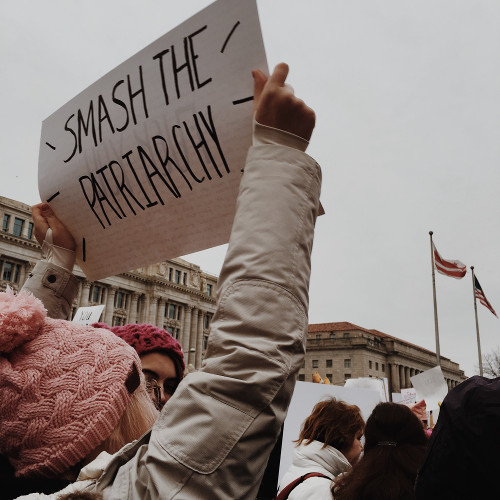
Feminism works to tear down a system that hurts men as well. Photo by chloe s. on Unsplash
Nov 1, 2020 • Avik Das
Today marks the start of Movember, a month-long fundraising effort focusing on men’s health. For me, I participate to bring awareness to mental health issues, specifically the way men struggle to handle their mental health issues.
The central problem with our struggle with mental health is a lack of support, which comes from two sources that feed into each other. First, we don’t talk about our emotions nearly enough, and we don’t build a support network to talk to in the first place. Men, how often have you felt isolated at a time of emotional need? If we’re going to solve these issues, we need to look to a movement that has forged a path for us: feminism.

Feminism works to tear down a system that hurts men as well. Photo by chloe s. on Unsplash
While feminism looks at societal problems through the perspective of women’s experiences, the core of the movement is to tear down a patriarchal system that affects people of all genders. Key among this framing is the idea that people don’t have to stick to stereotypical expressions of their gender identity, and in fact, some expressions aren’t even inherent to those gender identities.
When it comes to masculinity, it’s okay to identify as man and even to take on traits we associate with manhood. However, it harms us to adopt the negative norms associated with that identity. These negative norms, and the negative ones alone, form what is known as toxic masculinity.
A prominent example of such a negative association is the idea of a “tough” man. Bottling up your emotions is considered a male trait. But as men, we should be open about our emotional state. Doing so early helps us process those emotions, get help responding to those emotions and avoid building up those emotions to a point where they are too strong to manage. This requires two parties: we as men have to open up, and we have to encourage other men to open up without judgement.
By being open, it helps us avoid harming ourselves, but also helps us avoid harming others, including women. And for that reason, removing the negative parts of stereotypical male expression is a topic feminism has explored, the lessons from which we can build upon.
Feminism has, at times, struggled with intersectionality, the idea that marginalization compounds itself when multiple types of discrimination are involved. Whether it’s an issue of white feminists excluding People of Color, or cis-gendered feminists excluding trans women, no movement of social progress can survive without acknowledging the diverse ways people experience the world.

Factors such as race add another set of expectations on people, including men. Photo by Clay Banks on Unsplash
In the same way, the police brutalization of Black men and a culture of “othering” Black communities leads to an expectation of Black men to be hypermasculine in all the wrong ways. Socioeconomic oppression causes men in poverty to cling onto traditional notions of masculinity that give them a tiny bit of power over others. These toxic expectations come from different sources, whether that be racism, classism or other aspects of the matrix of domination (another term originating from intersectional feminist thought). The important part is all these interconnected phenomena matter when separating our male identity from the societal factors that prevent us from opening up.
Putting this all together, when we as men strive to move forward in the world, we need to re-evaluate the expectations put on us. In the workforce, my goal is to become a leader within my team and company, but I don’t have to do so with aggression and putting down others. I can do so with empathy. Flipping these expectations means I don’t have to live up to a standard I’m not comfortable with, which is good for my mental health, but it also means others can grow in the ways they feel comfortable.
This month, join me in my journey to be more vulnerable, and in convincing other men to open up as well. Along the way, we can look to the progress feminism has made for guidance.
The Movember Foundation advocates for men’s health by bringing awareness and funding social programs. If you want to be a part of this movement, please consider donating to my Movember page. And please spread the word, so we can take action together.